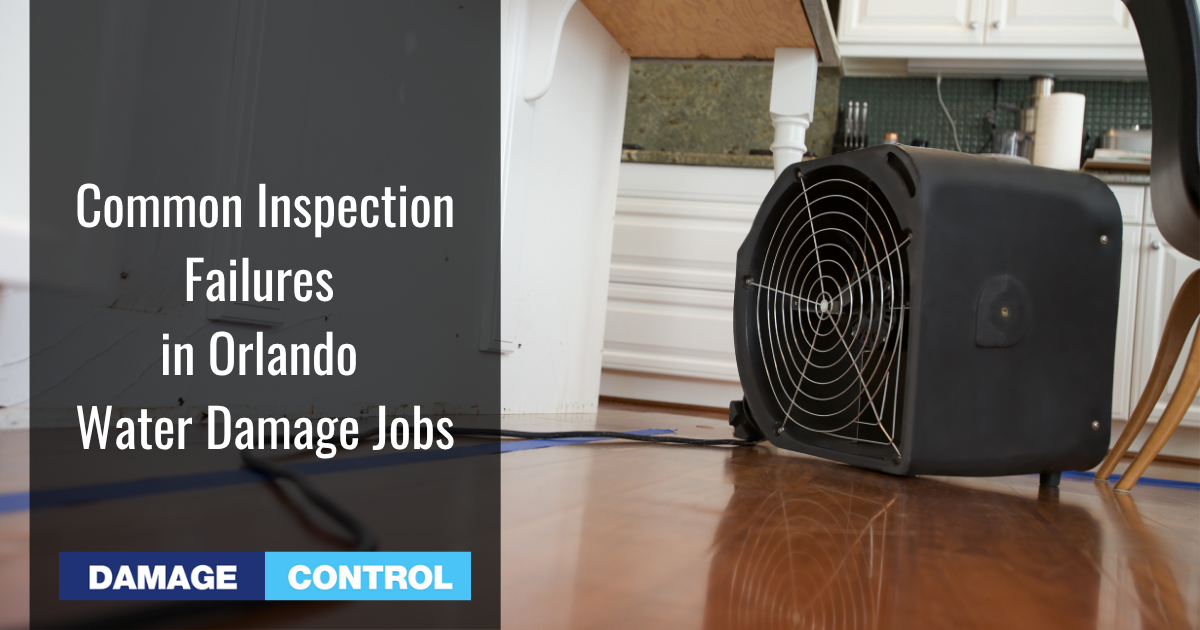Water damage can harm your home’s structure, wiring, and plumbing. Common Inspection Failures in Orlando water damage can be corrected quickly. Ready to get started?
In Orlando, you need a permit for many types of water damage repairs. Once the work is done, the city sends an inspector to check it.
This inspection makes sure everything was fixed the right way. It also ensures the work follows safety rules and the city’s building code. But sometimes, jobs fail inspection. This can cause delays, more costs, and extra work.
What Causes Inspection Failures in Orlando?
Inspection failures in Orlando happen because something wasn’t done correctly. It could be a small mistake, like using the wrong materials. Or it could be a big issue, like missing a plumbing connection or not fixing hidden mold.
Inspectors check every part of the repair closely. If they find a problem, they won’t approve the work. You’ll need to fix the issue and schedule another inspection.
Poor or Incomplete Repairs
One common reason water damage jobs fail is poor workmanship. This happens when the contractor cuts corners or rushes the job. It may also happen if you try to do it yourself without the right tools or training.
Examples of poor work include:
- Patchy drywall that doesn’t match the original wall
- Loose floor tiles or uneven surfaces
- Paint covering water stains without fixing the leak first
If the repair doesn’t look solid or complete, the inspector will likely fail it.
Unapproved or Incorrect Materials
Using the wrong materials is another big problem. In Orlando, all building materials must meet safety codes. If a contractor uses materials that don’t meet these rules, the work will fail inspection.
For example:
- Using drywall not rated for moisture in bathrooms
- Installing pipes that don’t meet Florida plumbing codes
- Using low-quality sealants around tubs or sinks
Always ask your contractor what materials they plan to use. Make sure they follow code.
Electrical and Plumbing Mistakes
Water damage often affects electrical wiring and plumbing systems. If these aren’t fixed the right way, the inspector will fail the job.
Common electrical mistakes include:
- Loose wires
- Improper connections
- No GFCI outlets in wet areas like bathrooms or kitchens
Common plumbing failures include:
- Leaks at pipe joints
- Poor drainage slope
- Using the wrong size or type of pipe
If a licensed professional doesn’t handle this work, it may not pass inspection.
Hidden Damage Left Unfixed
Sometimes contractors only fix what you can see, not what’s behind the walls. This is a major reason for inspection failure. Moisture behind walls or under floors can lead to mold, rot, or future water damage.
Inspectors often use moisture meters to check hidden spots. If the area is still wet or damaged, they won’t approve the repair.
Make sure all wet materials are removed and the area is fully dry before sealing it back up.
Skipping Required Permits
In some cases, homeowners or contractors try to skip the permit. They think it saves time or money. But when the city finds out, they may stop the project and issue a fine.
If work is done without a permit, it’s likely to fail inspection—even if it looks good. You may need to redo the entire repair just to meet code. Always get the proper permits before starting.
Missed Inspections or Poor Scheduling
Failing to schedule inspections at the right time can also cause problems. Some jobs need more than one inspection—for example, one before walls are closed and one after everything is finished.
If you skip the early inspection, the city may not approve the final one. Always follow the city’s inspection timeline.
Inspector Access Issues
Sometimes, inspections fail not because of the work, but because the inspector couldn’t do their job. If the inspector can’t see the repair, check measurements, or access a space, the job can’t be approved.
Common issues include:
- Locked doors or gates
- No one home to let the inspector in
- Furniture or clutter blocking the area
Make sure the inspector has clear, safe access to every part of the project.
How to Avoid Inspection Failures
The best way to avoid failing is to work with a licensed, experienced contractor. These pros understand the city’s codes and know how to meet them.
Here are a few tips to help your job pass:
- Get the right permits before starting.
- Use approved materials that meet building codes.
- Hire licensed plumbers and electricians.
- Keep everything clean and ready for inspection.
- Be on time for scheduled visits.
- Don’t hide any parts of the repair.
What Happens After a Failed Inspection?
If your job fails inspection, don’t panic. The inspector will give you a list of what went wrong. You or your contractor will need to fix these issues.
After the fixes are complete, you can reschedule the inspection. If the corrections are done right, the job should pass the second time.
Try to fix everything quickly. The city may charge for re-inspections if you delay too long.
Final Thoughts
Water restoration repairs in Orlando often require inspections. Passing them helps keep your home safe and up to code. But many jobs fail because of simple mistakes or poor planning.
If you understand what inspectors look for, you can avoid delays and extra costs. Use the right materials, , and always follow city rules. With the right approach, your project will pass the first time and stay protected for years to come.

